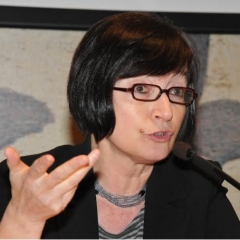Silvana Patriarca

Professor of History
Email: [email protected]
Office: Dealy Hall 625
Phone: 718-817-3937
-
1992: PhD, History, Johns Hopkins University, Baltimore, MD
1986: MA, History, University of Texas at Austin
1981-82: Université de Liège (non-degree)
1980: Laurea in Lettere, Summa Cum Laude, Università di Torino -
I came to Fordham in 2002 after teaching at Columbia University and the University at Florida at Gainesville. I specialize in the socio-cultural history of modern Italy from the Risorgimento to the present and currently my main research interests focus on the history of nationalism and racism in connection with the construction of Italian – and more generally European - national identities. My most recent book, Il colore della Repubblica (forthcoming in English as Race in Post-fascist Italy) explores the persistence of ideas of race after the collapse of fascism and their impact on the representations and life experience of the children born from the encounter between Italian women and Black Allied soldiers at the end of the Second World War.
In my approach I engage with interdisciplinary perspectives and in previous work I studied a variety of subjects from the discourse of national character (the subject of my second book, Italian Vices), to the nativist rhetoric of the Northern League, from the politics of emotions in national-patriotism, to the history and politics of social quantification and the making of social categories and classifications (on which I wrote my first book, the award-winning Numbers and Nationhood). Most recently I began exploring the development of anti-racist sensibilities in post-1945 Italy in connection with the history of the civil right struggle in the US and the influence of African American music.
My research had been funded by various institutions, among which the Italian Academy for Advanced Studies in America (at Columbia University) and the National Humanities Center.
-
Race in Post-fascist Italy: “War Children” and the Color of the Nation, forthcoming Cambridge University Press, February 2022.
Italian transl.: Il colore della repubblica.“Figli della guerra” e razzismo nell’Italia post-fascista. Turin, Einaudi, 2021.The Risorgimento Revisited. Nationalism and Culture in Nineteenth-Century Italy, co-edited with L. Riall (Palgrave-Macmillan, 2012)
Italian Vices. Nation and Character from the Risorgimento to the Republic (Cambridge University Press, 2010); Ital. transl.: Italianità. La costruzione del carattere nazionale (Laterza, 2010)
Numbers and Nationhood: Writings Statistics in Nineteenth-Century Italy (Cambridge University Press, 1996); Ital. transl. Costruire la nazione. La statistica e il Risorgimento (Istat, 2011).
-
“Fear of Small Numbers: ‘Brown Babies’ in Postwar Italy,” in Contemporanea. Rivista dell' '800 e '900, December 2015.
“Gli italiani non sono razzisti”: costruzioni dell’italianità tra gli anni Cinquanta e il Sessantotto,” in Il colore della nazione, ed. Gaia Giuliani, Le Monnier, 2015.
“Relazioni pericolose: “razza” e nazione nel Risorgimento,” in La costruzione dello Stato-nazione in Italia, ed. A. Ricciardi, Rome, Viella, 2012.
“A Patriotic Emotion: Shame and the Risorgimento,” in The Risorgimento Revisited. Nationalism and Culture in Nineteenth-Century Italy, ed. Silvana Patriarca and Lucy Riall, New York, Palgrave Macmillan, 2012.
“Unmaking the Nation? On the Uses and Abuses of Garibaldi in Contemporary Italy,” Modern Italy 15: 4 (2010).
“Il sesso delle nazioni: genere e passioni nella storiografia del nazionalismo,” Contemporanea. Rivista di storia dell’800 e ‘900, 10 (2007).
“Indolence and Regeneration. Tropes and Tensions of Risorgimento Patriotism,” The American Historical Review, 110: 2 (2005).
“National Identity or National Character? New Vocabularies and Old Paradigms,” in Making and Remaking Italy. The Cultivation of National Identity Around the Risorgimento, ed. A. R. Ascoli and K. von Henneberg (Berg, 2001).
“Italian Neo-Patriotism: Debating National Identity in the 1990s,” Modern Italy 6:1 (2001).
“Essayists and Journalists, c. 1850-1914,” in A History of Women’s Writing in Italy, ed. L. Panizza and S. Wood (Cambridge University Press, 2000).
“How Many Italies? Representing the South in Official Statistics,” in Italy’s “Southern Question”: Orientalism in One Country, ed. J. Schneider (Berg, 1998).
“Gender Trouble: Women and the Making of Italy’s ‘Active Population,’ 1861-1936,” Journal of Modern Italian Studies 4 (1998). -
Graduate:
Mediterranean Europe Since 1800
European Fascisms, 1919-1945
Comparative Nationalisms
Nationalisms and Racisms in Modern Europe
Undergraduate:
Contemporary History
Understanding Historical Change: Modern Europe
Modern Italy
Italy in the Wider World
Italy Through Foreign Eyes
Nationalisms in the Modern World
Race and Nation in Modern Europe
Global Italy
Fascism from Mussolini to the Present